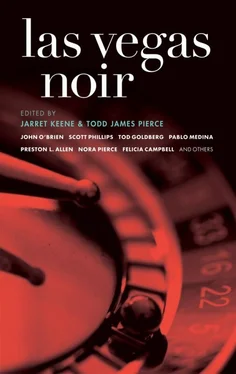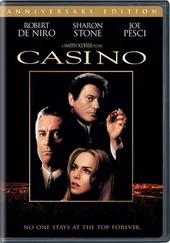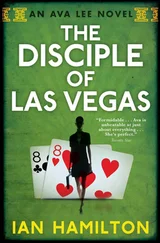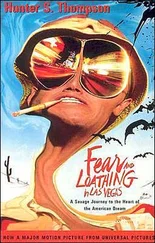Inside, the restaurant was cool and dark and very Zen. Piano music drifted along the ceiling beams overhead. Booth tables with high wooden seats, lighted by small suspended lanterns, lined the walls like confessionals. Candlelit tables filled in the space between the booths and the circular sushi bar, which stood in the center of the restaurant like an island, manned by three sushi chefs in white who with their hats resembled sailors. Flanking the bar were two enormous aquariums, filled with exotic-looking fish that were staring out calmly at the twenty or so patrons in the restaurant, most of whom easily out-dressed me.
I asked for a table near the bar and ordered a Japanese beer and told the hostess I was waiting for a friend. I’d barely wet my lips before Sonny’s young doberman appeared and sat himself across from me, just as casually as if I’d invited him.
He was now dressed in a black pinstripe suit, set off by another beautiful pink tie, looking very ready to be anyone’s best man. He waved at a waitress, who swiftly brought him a bottle of Perrier and a glass with a straw. Pouring the Perrier into the glass, he said to me, “So you did not like my advice.” His voice was gentle but humorless.
“I appreciate the wisdom — but my business with Sonny is important.”
“I know it is,” he said, nodding agreeably. “Except my father has no business with you .” He sipped his Perrier with the straw like a child. In the aquarium directly behind him, a long brown eel swam slowly through his head.
“Your father, huh? Well, I guess that makes some sense.” I downed half my beer, wiped my mouth with two fingers. “So how do you know who I am?”
“Your friend Happy is also a friend of mine. She visits here often. She came to me last week and told me what you have been planning to do. She told me for your sake. She likes you, Mr. Robert, and she knows you can be a foolish man. She did not tell Suzy, of course, or my father. So only I know that you are here. And that, Mr. Robert, is a good thing.”
“Because your father is a dangerous man?”
He eyed me sternly, drawing together his dark handsome eyebrows. “Because my father does not have my patience.”
A waiter came by and whispered something into his ear, and Sonny Jr. looked to the front doors where two large parties of customers had just appeared. He stood from the table and gestured at the hostess, who walked quickly over to our table, and he gave her and the waiter rapid orders in Vietnamese. He glanced at me, a bit distractedly, then turned again to them and went on with his instructions. He watched them walk away and continued watching as they saw to the parties. His father might have been a poker-playing gangster or maybe a gangster-playing poker player, but I was getting the feeling that Junior was nothing more than what he appeared: the young manager of a restaurant.
He appeared to sigh and finally turned back to me, adjusting his tie, his face once again as calm as the fish. “You are a police officer, so I should not show you this. But I know you are here with other, less official concerns, however silly they might be. Please come with me then.”
“And where are we going?”
“As I said, you are the police officer here. It should be me who is nervous.”
I offered him a smile, which he did not return. I stood and followed him to the kitchen.
We passed two private tatami rooms, each being prepared by the staff for the new parties. Foolishly or not, the presence of so many people eased my mind a bit.
The kitchen was staffed by Mexicans and Asians, all in white uniforms. No one paid us any attention as we walked to the back, toward a door marked Office . Junior unlocked it, and once we stepped inside he relocked it and approached a huge, life-size oil painting of a geisha walking up a dark flight of stairs. There was a clock on the wall beside it, which he set to midnight, then he turned the minute hand three revolutions clockwise and two revolutions counter-clockwise. The painting slowly swung open from the wall like a door, revealing a passageway and a dark descending staircase. He walked down and without looking back at me said, “It will close again in five seconds.”
We reached a long dim hallway and passed six closed doors, each with a keypad over the knob. At the end we stopped at a door that was set much further away from the others. He punched a series of numbers on the keypad and something clicked. He pushed the door open completely before moving inside.
I heard soft Oriental music. The room glowed bluish and shimmered. It was no more than a thousand square feet, but felt cavernous, with walls of glass surrounding us — behind them water and fish. I had entered a gigantic aquarium. Each wall showed the flushed faces of four separate tanks, framed in quadrants like enormous television monitors, their blue waters filled with stingrays and sharks and what appeared to be piranha and other odd-looking fish, all swimming around beds of corral and white gravel. Against the brick wall behind me were three aisles of smaller aquariums, with smaller fish, stacked on two rows of iron shelves. On a large Oriental rug in the center of the room stood a black leather couch, two dolphin chairs, and a glass coffee table.
Sonny Jr. went to the table and took a cigarette from the pack lying there, lit it, and approached the tank of stingrays. I felt a movement behind me and turned to see, at last, the seven-foot Mexican standing in the hall just outside the doorway, his forehead out of view. God knows where he’d come from. His white apron looked like an oversized bib, and he still wore that heavy, dull-eyed Frankenstein expression. Junior spoke Vietnamese to him and he stepped inside the room, bowing to do so, and closed the door. So that was at least three languages the Mexican understood.
“Is Dad making an appearance too?” I asked.
“He is not here, Mr. Robert,” Junior replied calmly, and ashed into an ashtray he held in his other hand — yet another annoyingly formal mannerism. He gestured at the entire room and said, “But I have brought you to meet his fish. These are all illegal, you see. And all very expensive. This one here,” and he pointed at a foot-long fish with a huge chin and an elongated, undulating body, “is a silver Asian arowana, also called a dragonfish, as you can see why. Our clients will pay over ten thousand dollars for one.”
“I can sell you my car for half that.”
He turned his back to me, ignoring the comment, and continued, “We installed a couch and a stereo because my father likes to come here and relax. The fish, the lights, and the music give him peace. For all his flaws, he is a man who values peace.”
I took a step toward him and heard the Mexican shuffle his feet behind me. I spoke to Junior’s back: “I’ve met your fish. Why else have you brought me here?”
He turned around and expelled smoke through his nostrils, dragon-like. “I have brought you here to tell you a story.” He licked his lips and brushed ash from his breast. “You see, my father appreciates these fish because they are beautiful and bring him a lot of money. But he also appreciates them because they remind him of home — they bring home to him. It is the irony, you see, that is valuable: a tiny tropical ocean here in the middle of the desert; all these fish swimming beneath sand. The casinos in this city sell you a similar kind of irony, but what we have here is genuine and real, because it also keeps us who we are.”
“ Who you are? No irony, you think, in you and your father owning a Japanese restaurant?”
“Shut up, Mr. Robert, and listen.” He put out his cigarette and walked over to take a seat in one of the dolphin chairs. He unbuttoned his jacket and crossed his legs elegantly. He offered me the face of a boy, but sounded like an old man. “More than twenty years ago, my parents and I escaped Vietnam by boat. Two hundred people in a little fishing boat made for no more than twenty, headed for Malaysia. On our second night at sea we hit a terrible storm and my mother fell overboard. It was too dark and stormy for anyone to see her or hear her cry out, and the waters were too rough to save her anyway. She drowned. I was seven at the time. I will not bore you with a tragedy. I will only say that her death hardened my father, made him more fearless than he already was.
Читать дальше












